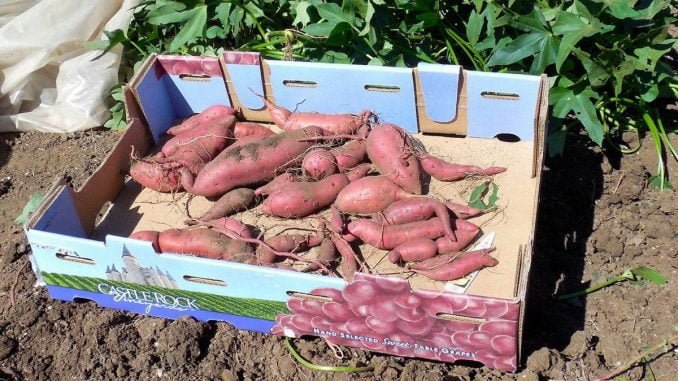
Wakiso, Uganda | URN | Several subsistence farmers in Busiro North Constituency in Wakiso districts are gearing towards joining efforts to grow sweet potatoes to satisfy the growing demand for livestock products and to raise incomes by generating additional value-added through processing.
Busiro North which includes sub counties of Kakiri, Masuulita and Namuyumba is known to have vast pieces of land much of which lie idle although it’s occupants are hard hit with poverty.
The area with fertile soils is part of the Luweero Triangle which was greatly affected by the 1980 bush war and for the last thirty years, the area has remained almost less productive with residents blaming all their misfortunes to the war.
Now, Michael Lubulwa, the Wakiso district production officer, shares that the district is working closely with Universal Initiatives Development Organization to embark on mobilizing community members, regardless of the size of the land they own, to grow sweet potatoes which will be collected in a pool before processing into forage.
Lubulwa says that currently the cost of balancing domestic demand for livestock products with feed or livestock imports has become prohibitively expensive which gives farmers a chance to use sweet potatoes as animal feeds and make some money.
The production officer further explains that besides the renowned silage that can be made out of potatoes vines, which is highly needed by livestock farmers, the roots are also used in making pellets. He explains that although sweet potatoes are the third largely grown food crop, farmers should stop growing it for mainly home food production.
He adds that a few families in the area have already been growing a few potatoes in their gardens which at times could rot during the process of looking for market thus the project will help them to throw away all worries of the market.
Nelson Kazima Mweru, the potato enterprise technical advisor, notes that they have already initiated over 200 families each with at least one acre of land where they can grow the food crop.
“It is not easy for one farmer in this area to produce commercially viable tonnes of potatoes required for processing. We are still sensitizing more people by showing them the benefit of coming to together,” says Mweru adding that they have already been assured of ready markets of their animal feeds in Kenya. He, however, adds that even before thinking of the Kenyan market, there is already a wide local market.
Farmers in Kakiri are optimistic that the initiative will yield results. Justine Namubiru says that growing a crop with the availability of a ready market is the joy of farmer. She likens the initiative to farmers’ cooperatives as they used to function in the 1960s and ’70s.
Sedona Babirye attests that they have undergone some training on how best to grow the crop and how to handle it after harvesting. According to her, they are just waiting for the next rain season.
Read Also: Dependence on agriculture sign of backwardness – President Museveni
Paddy Galabuzi, the Wakiso district planner, says the district is also looking for several farmers in the same project who own larger pieces of land so that they help them acquire solar-powered irrigation units. He says that the district has a number of development partners who would like to offer support as an effort of changing the mindset of farmers.
“This is already a good venture but needs constant production, they cannot deepen on rainwater which is received just two seasons in a year. With irrigation, production will be flowing all year through. The only problem is that their might a few of them who having lad where irrigation can be applicable,” says Galabuzi.
Col Fred Ssegamwegwe, the Operation Wealth Creation coordinator in Wakiso District, observes that they are also ready to support the initiative by supplying inputs. How however he points out that this will be done only if there is a good number of farmers who have decided to grow the crop.



